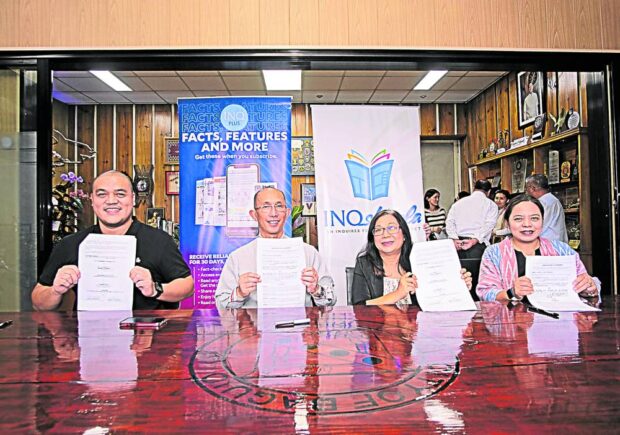
LGUS ON BOARD Local government units like Baguio City and Victorias City have seen INQskwela’s promise. Left photo shows Baguio City Mayor Benjamin Magalong (second from left) signing a memorandum of agreement (MOA) with Inquirer national sales manager Roy Mendiola and Inquirer Foundation executive director and assistant vice president for corporate affairs Connie Kalagayan (third). —NEIL CLARK ONGCHANGCO/CARLA GOMEZ
The Philippine Daily Inquirer’s INQskwela project, which provides free access to Inquirer’s digital edition (Inquirer Plus or INQPlus), had been integrated into a Baguio City government program called Smart Learning Communities (SLC) and was among the initiatives tackled at the two-day Singapore EDUtech Asia Conference last month.
SLC taps digital technology to “make public education relevant and to address learning recovery,” said Soraya Faculo, head of the Baguio City Schools Division.
Part of the program is INQskwela, which schools use to teach English and Araling Panlipunan, as well as for student research.
Baguio is among the latest localities to partner with Inquirer for the INQskwela project.
The partnership was sealed on July 12 and was led by Baguio Mayor Benjamin Magalong and Faculo, along with the Inquirer’s national sales manager Roy Raul Mendiola and assistant vice president Connie Kalagayan.
Estrela Cariño, Cordillera director of the Department of Education, raised the SLC during a panel discussion on the impact of artificial intelligence (AI) on modern education, Faculo said.
“INQPlus has text-to-speech features so learners have to either listen to the news or read the news. Apart from practical reading, its audio feature is great for pupils who learn quicker through auditory learning. It is AI-powered,” she said.
Victorias Mayor Javier Miguel Benitez also signs a MOA with Mendiola. —NEIL CLARK ONGCHANGCO/CARLA GOMEZ
READ: Growing roots: Inquirer and its employees stood the test of time
READ: Philippine Daily Inquirer disclaims e-mails regarding Notice to the Public ads
Blended learning
Faculo added: “Our goal (for SLC) is to make all 67 Baguio public schools smart schools within three years by exploring several learning options like blended or hyflex learning (hybrid and flexible or a combination of physical classroom lessons with additional teaching online or through radio or TV broadcasts) using AI-aided tools,” Faculo told the Inquirer.
She said teachers would be trained to navigate different technologies, with equipment support provided by the local government’s Special Education Fund.
SLC also allows teachers to receive more efficient feedback and data collection mechanisms by holding examinations online, Faculo noted.
Fighting fake news
On March 23, the local government of San Manuel in Tarlac province became the fourth locality to partner with the Inquirer and the Inquirer Foundation for INQskwela when the project was revived last year after being halted by the COVID-19 pandemic.
The partnership, which aims to promote literacy and fight fake news, gave 13 public elementary schools, two integrated schools, and two public high schools free access to INQPlus.
“We’re gaining so much from this program because children become more aware of the importance of reading. Their comprehension skills have improved all the more,” said Artbie Samson, principal of San Agustin Integrated School, which is among Inquirer’s partner schools in San Manuel.
According to Kesha Larino, a Grade 3 pupil from the same school, she was able to enhance her reading skills and vocabulary through the Inquirer’s digital app.
“Reading news from INQPlus has improved my ability to read. I’m learning new words each time I read the news,” Larino shared.
On July 17, it was the turn of Calumpit town in Bulacan province to tie up with the Inquirer and Inquirer Foundation for the INQskwela project.
Calumpit became the sixth locality to partner with the Inquirer for the program.
Teachers and students of Frances National High School, one of the seven partner schools in Calumpit, have been eager to get access to the newspaper’s digital platform, said school principal Virginia San Gabriel.
INQPlus, San Gabriel said, helps students develop their knowledge about journalism, particularly in news writing.
San Gabriel said INQPlus became their reliable source of news and current events.
Gatekeeping
In Negros Occidental province, Mayor Javier Miguel Benitez of Victorias City said INQskwela had given local teachers credible information that helped improve their teaching.
Victorias City is the first local government in the Visayas, and the fourth in the country, to partner with INQskwela.
“What is missing in our social media platforms is to have a gatekeeper to facilitate news that is worthy for us to read and that is what INQskwela is doing,” Benitez said.
Ma. Agnes Peñas, Victorias Education Program Supervisor in Araling Panlipunan, said students and faculty of the 19 target schools in Victorias were given access to the Inquirer’s digital version.
She said their monitoring showed that 11 schools with stable internet connections were actively implementing the project.
Teachers use materials available in INQPlus, particularly news and current events and scientific information, for their daily lessons, presentations, learners’ activities, and performance tasks and assessment, Peñas said. The program, she said, is also useful in integrating campus journalism into their curriculum.
A major activity that the Victorias schools division recently conducted using materials from the Inquirer through the INQPlus partnership is the Division and Regional HistoQuiz, where students were directed to search relevant information from the digital version of the newspaper, Peñas added.